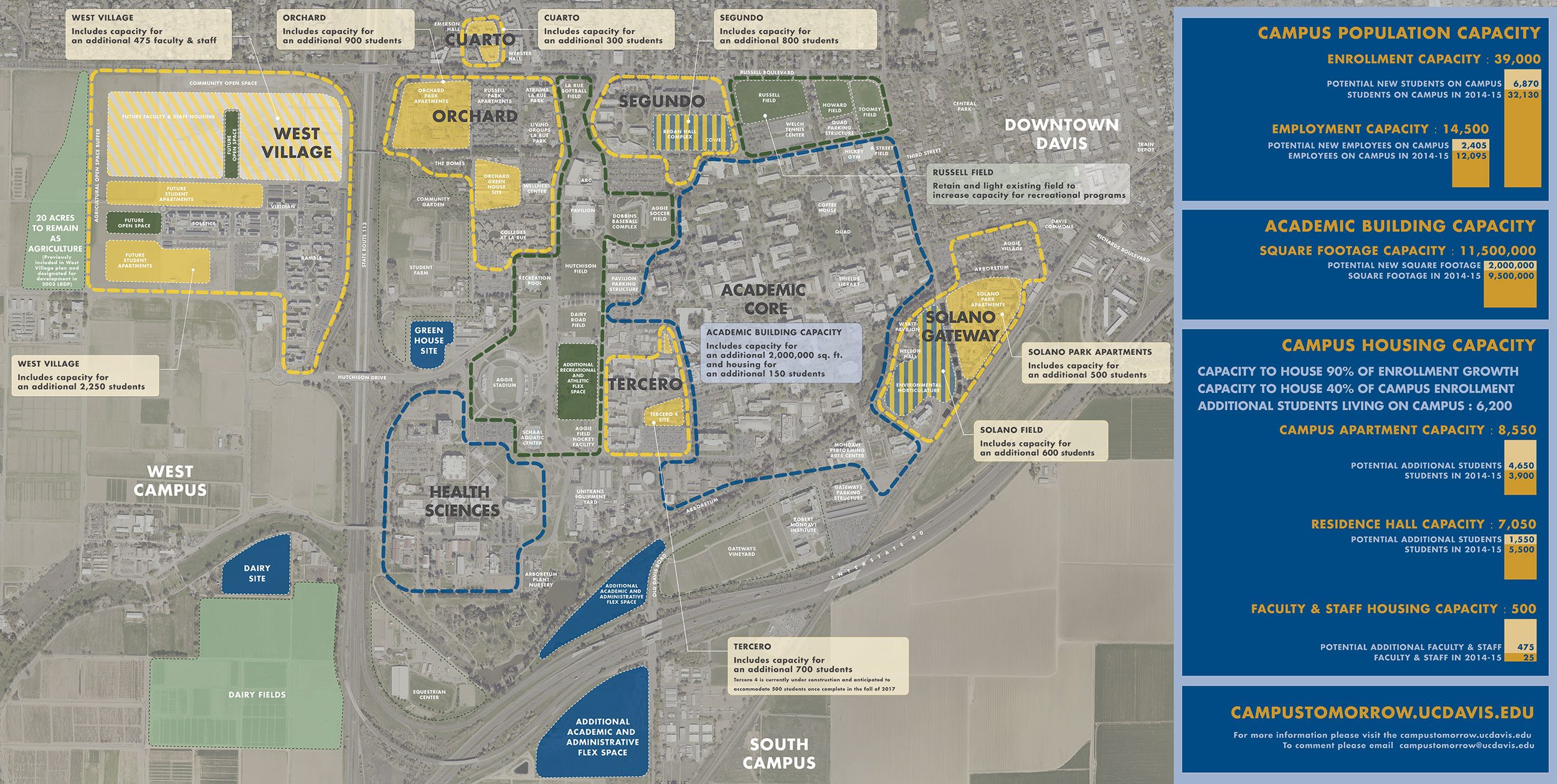 by Dan Carson
by Dan Carson
I have reviewed the draft “LRDP Interests Framework” that you will be discussing on Tuesday. My comments are not intended to represent the views of the Finance and Budget Commission, of which I am vice chair, but do represent my views as a citizen of Davis.
- Good Process But We Need Good Results. The LRDP Interests Framework represents a significant first step in systematically organizing the city’s potential response to the LRDP in an organized way that permits broad public input and the opportunity to identify concerns at the beginning of the process. This approach is a much better one than occurred with the 2003 LRDP, which ultimately left much of the burden to Davis citizens to individually and collectively fight for the city’s interests and led to litigation by myself and others by the West Davis Neighbors, a community organization. It is my hope that this approach will foster city-campus collaboration and avoid town-gown tension and litigation. But much depends upon how the campus ultimately responds to the legitimate concerns of the city and its citizenry. We need a good process but we also need good results.
- We May Need to Broaden the Issues List Later. The document should include a summary statement that the city of Davis will expect and will insist that the environmental impact review of the LRDP will accurately and fully depict all of the environmental impacts of the project on the city and the environment as a whole. Moreover, the document should state that the city will expect and will insist that the campus will incorporate all necessary and feasible mitigation measures to resolve those impacts. At this time, the campus has not publicly released the actual LRDP proposal (only conceptual information) and of course has not released a draft EIR of the LRDP. While the LRDP Interests Framework touches on many important issues that are likely to be relevant to the process, it is possible that these forthcoming campus documents will surface novel issues the public is unaware of and that could have a significant impact on the citizens of Davis. You should signal to the campus upfront that you will likely need to broaden the list of discussion items once the city and its citizens have had a chance to scrutinize these documents.
- Seek to Negotiate a Legally Enforceable Agreement. The document should include a summary statement that the city of Davis will seek the adoption of a joint Memorandum of Understanding to ensure that UC Davis promises of mitigation are carried out. The EIR for the last and highly controversial LRDP, for example, contained a promise to negotiate a fair share contribution to mitigate traffic impacts from campus growth. However, the LRDP EIR stopped short of making a commitment to actually making such a fair share contribution. No MOU was ever negotiated, and no fair share contribution was negotiated to my knowledge, even though the resulting impacts of campus growth on the city in the ensuring years has been very significant. This time, the city should insist on the negotiation and adoption of an MOU in advance of any implementation of a new LRDP. That MOU should be specific and legally enforceable and contain provisions that spell out the consequences if its provisions are violated. This MOU could also be a platform for the city to incorporate the commitments it is willing to make for collaborative efforts in trade for actions by the university to mitigate the negative impacts of its growth on the city. In my experience, clear and well-prepared and enforceable contractual agreements don’t create problems — they avoid them. An FBC subcommittee is examine how such agreements have worked out at other UC campuses.
- Broader LRDP Mitigation Revenue Stream Should be Sought. The document appropriately highlights the city’s intent to seek funding from the university to improve traffic problems in the Richards/Olive Drive Corridor and UC participation in fair share transportation impact fees for proposed growth as well as to deal with past growth. This is a very important provision of the LRDP Interests Framework, in my opinion, given the huge impacts of our biggest employer, UC Davis, on our streets and roads and bike paths. However, I think the LRDP Interests Framework should be amended to state the city’s intent to negotiate a broader revenue stream from the university that would also mitigate the impacts of campus growth on (a) the city’s property tax base, particularly from university occupation of commercial space exempt from property taxation, (b) housing availability and costs within the city limits, especially for renters, (c) the impacts on parking, including on downtown businesses and on residential communities that must live with parking permits and other impacts, (d) impacts on other city services, such as police and parks. If it has not already begun to do so, the city should draft analyses documenting these impacts, if need be with the help of consultants. This city faces severe fiscal challenges. UC Davis should be a part of the solution. For example, part of the monies from such a revenue stream might be used to address our need for affordable housing for students and thus would be to the benefit of both the city and the campus.
- Focus on Providing More Housing On-Campus Makes Sense… The move by the campus to meet a greater share of the student housing burden on-campus is commendable The LRDP Interests Framework appropriately seeks to solidify and expand this commitment by the campus and to take some of the pressure off of the city’s housing supply and costs.
- …But Where That Housing is Placed Is Important. In regard to housing proposals contained within the LRDP, the city raises concerns about the Russell Boulevard housing proposal. In addition, the LRDP Interests Framework should be modified to state that the city will be seeking the inclusion within the EIR of a housing site alternative that focuses on potential internal sites on campus, such as the land south of the West Village development and adjacent to Highway 113. West Davis Neighbors argued for the study of such an EIR alternative when the 2003 LRDP was proposed. However, the campus refused to consider that EIR alternative back then, which in all likelihood would have been an environmentally superior alternative to the West Village project that has since been partially built out. The city should signal its desire that these and similar housing site alternatives be studied that could reduce the impacts on the residential neighborhoods surrounding the campus.
- Clarify Aspects of the West Village Proposal. The LRDP concepts presented by the campus to the community appropriately include a new buffer zone on the western edge of the proposed West Village development. However, the LRDP Interests Framework should be modified to state the city’s intent that any new LRDP (a) include a commitment by the university to maintain this buffer zone in perpetuity and (b) reaffirm the university’s prior commitment as part of the 2003 LRDP process to allow only emergency vehicle access from the West Village project from Russell Boulevard. These measures would help assure city residents that their neighborhoods will not be overwhelmed with traffic from West Village, especially now that plans are being proposed to allow two students instead of one to live in many of the apartment units that exist there now.





Mr. Carson has provided a comprehensive and thoughtful commentary on the LRDP, with many good suggestions I hope will be pursued by City Council. In particular, he has cited one of the problems with UCD’s current LRDP adoption schedule. To my knowledge UCD has thus posted nothing more than a summary LRDP slide show on line, with an announcement that the CEQA Notice of Preparation (NOP) and Initial Study (IS) will be released January 4, 2017 for a 30-day comment period. I have yet to find the full LRDP document available on-line.
In addition, there will be a 2-hour EIR scoping meeting held on campus starting at 4:30 PM on January 25. Interesting that the scoping meeting will be held the same day as the first day of the Regents’ 2-day regularly scheduled meeting in the Bay Area. That sort of makes it tough for anyone who wants to make public comment to the Regents in rebuttal to Interim Chancellor Hexter’s ridiculous and ill-considered comments to the Regents in November.
That’s a really tight schedule. First, even if the detailed LRDP document were released today, that would give City officials and interested parties just over 3 weeks to read, digest and analyze it during the busy year-end holidays, when Council has an abbreviated meeting schedule and many key City staff may be on vacation.
Then, starting January 4, City officials, other agencies, and interested citizens will have just the minimum legally required 30 days to finish reading the LRDP, read and analyze it in the context of the IS (which could very well be a very long document itself), and then formulate and submit written comments. (And written comments are always better than just oral scoping meeting statements in such instances.)
On top of that, the scoping meeting will be held on campus at a time of day (4:30 – 6:30 PM) that will make it difficult for many busy working people to attend, especially for those unfamiliar with the campus layout. Given the intense interest shown in the LRDP by the Council, the number of residents who attended the recent Council meeting, plus letters to the Enterprise and postings in the Vanguard, UCD should also schedule a second off-campus scoping meeting at a time and location more convenient to Davis citizens who work full-time. The Davis Senior Center or other public facility would be ideal, and sometime during the 3rd or 4th week of January to allow for adequate time for attendees to review the documents beforehand.
The LRDP process has been ongoing for well over a year. I have difficulty seeing why completing the draft and launching of the EIR process should be jammed into the holiday period. It gives the appearance of inadequate transparency. Unless, of course, UCD has adopted a tight year-end schedule on purpose to “slip under the radar” and minimize knowledgeable review and comment.
Carson is also correct that final approval of the LRDP by the university and the Regents should be postponed until the City and UCD have negotiated and executed a legally binding document that will obligate UCD to completing all necessary measures to mitigate the impacts of LRDP implementation on the City of Davis and its residents. That document should also have mandated mutual review periods and calendar milestones. The lack of enforceability was an obvious and detrimental shortcoming to the 1989 MOU between the City and UCD.
Ideally, the Regents should also co-sign such a document to give it added enforceability. (This would be in the same manner that the Regents were a signatory to the Comprehensive Settlement Agreement executed among UC Santa Cruz, the City of Santa Cruz, and the citizens group that brought litigation against the university for continuing to pile on more students without a concomitant increase in on-campus housing.)
Thanks again to Mr. Carson for providing an excellent analysis and “food for thought” on a rainy Saturday morning.
Thanks for your kind comments. For the record, although it may be obvious to many, these comments were submitted to the council members in advance of Tuesday night’s council discussion of the LRDP matter.
Probably best to send that suggestion directly to Robert Segar:
rbsegar@ucdavis.edu
Thanks to Dan Carson for this excellent overview.
The City should ask UCD to do explore its own on-campus version of an inclusionary housing program. One of the major reasons why students don’t want to live on campus is the cost. It IS more expensive, but there are creative ways of dealing with that and an inclusionary approach is one. This would help the city by reducing waitlists for affordable housing on campus (despite rules on the books, many students do end up in affordable, subsidized housing even though in theory they aren’t supposed to).
Indeed, the U.C. needs a comprehensive affordability framework for on campus housing. You know what’s an easy way to do that? Base eligibility off of need-based Financial Aid eligibility, which is already legally well established.
Mathew: those are all excellent ideas. You may want to convey them to the Mayor and the rest of City Council, to include in the letter/position paper that the City is developing for delivery to UCD.